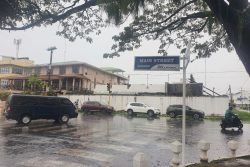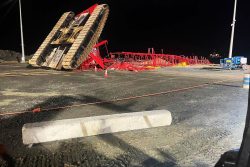Some of the earliest ‘returns’ from the recent disclosure that President Irfaan Ali would be moving in the direction of ‘decentralizing’ his own office along with those of various Ministries and other state-run agencies in order to make their services more accessible to Guyanese residing beyond the capital were made public in the Stabroek News of April 1st.
Beyond the matter of the challenge of access which Guyanese in far-flung regions have had to face, over time, there has also been what we commonly (and in many instances, accurately) describe as the ‘run around’ factor, a feature of which is the ‘contrived protocols’ erected by some state agencies seemingly for no other purpose then to frustrate service seekers. The number of times that one may be required to visit a particular state agency in the capital to have what may be an important but straightforward matter expedited has become an issue of sometimes unbearable frustration, to say nothing about what in so many instances have been travel and opportunity costs for persons residing long distances from the capital.
One imagines that the idea of the short term ‘decentralization’ of some of the key government departments, including the Office of the President, arose out of an eventual official acknowledgement that the quality of the various services offered in large parts of the country and those which could only be accessed in the capital continues to represent, in various ways, a ‘drag’ on development. Beyond that it may also represent a long overdue acknowledgement ‘at the top’ that in many instances and over time some of the state agencies administering services from the capital appeared not to care ‘two hoots’ about the impact of what, frequently, is the sloth, cumbersomeness and downright ineptitude manifested in the quality of their service delivery regimes.
Of course, Guyanese can hardly be blamed if they were to, at least in this early stage, dismiss the idea of the decentralization of state agencies exercise as a political gimmick. Over time, there has been no limit to the extent to which we have had such gestures put before us only to see these fall flat on their faces. One, however, would wish to think that the current idea of bringing government to the regions derived from one or more inspired official think-ins during which a suitably high-level decision was made that enhancing access to state services was desirable, not just as a means of securing political traction but also as a genuine gesture designed to seek to help eradicate a challenge that has been impeding all-round national development for generations.
President Ali and his political advisors can hardly be blamed for, first, recognizing that the dearth of central government services to communities across the country has been, over time, a widespread complaint among Guyanese and that to institute a fan-out of state agencies, including his own office, is by no means an unexpected strategy ahead of local government elections. That said, the point should also be made that he needs to be aware that politics in Guyana has always been littered with empty promises and seemingly earnest initiatives that fall flat on their faces. That apart, exercises such as this must never fail to take account of the need to pay attention to the broadest ethno/political swathe of communities across the country and to respect local government bodies. Beyond those considerations the continuity of the exercise that his administration has undertaken requires stamina and consistency, no attributes for which, truth be told, political administrations have, historically, been noted.
What then are we to make of the earliest public disclosure deriving from a report emanating from the President himself on the recent Region Three ‘outreach? On the surface, at least, it tells us that the President has been out of the blocks with the idea quickly, not a propensity for which our successive political administrations have been known. Delay and dilatoriness as follow-up to official promises have always been a prominent feature of the governance process in Guyana. That apart, and again not unmindful of the image-enhancing traction to be derived from such an exercise the administration’s image-minders appear to have opted for putting a numbers ‘spin’ on the exercise (‘5,000 issues raised in outreach’…..Stabroek News, April 1, 2023) understanding only too well that the ‘numbers game’ is likely to resonate with the mass audiences at which the message is evidently targeted. It can also come in quite handily as a political bragging rights ‘tool’.
Two considerations must be taken account of. The first is the importance of creating a radical transformation in which the performance levels of some state agencies based in the capital are enhanced above the levels that currently obtain. Here, and without ‘naming names’ as we say in Guyana, there can be little doubt that some of our more important state agencies have earned considerable criticism for equal measures of sloth and incompetence. The second consideration has to do with government ensuring that the rollout of what could well turn out to be an altogether worthwhile initiative does not become tainted by hints of prejudice that can quickly drag what, on the surface, at least, could be an altogether worthwhile initiative, down a path of partisan fretfulness.
If one of the President’s chosen strategies for enhancing his administration’s broad appeal is to seek to bring a sense of ‘balance’ to the delivery state services to the various regions/communities across the country there can be no question than that the success of the effort can win him a higher level of public approval. If, on the other hand, delivery were to become compromised either by the underperformance of the state agencies responsible for bringing about the desired change or by what might be perceived to be political prejudices in the distribution of the services on offer then the whole idea can quickly descend to the level of a poisoned chalice.






